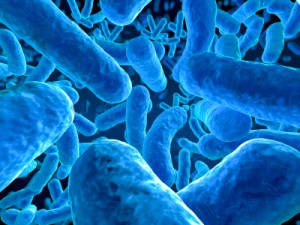 Every day scientists apply creative ideas to solve real-world problems. Every so often a paper comes up that highlights the creativity and elegance of this process in a powerful way. The paper “Programmable probiotics for detection of cancer in urine”, published May 27 in Science Translational Medicine, provides one great example of the application of scientific creativity to develop potential new ways for early detection of cancer.
Every day scientists apply creative ideas to solve real-world problems. Every so often a paper comes up that highlights the creativity and elegance of this process in a powerful way. The paper “Programmable probiotics for detection of cancer in urine”, published May 27 in Science Translational Medicine, provides one great example of the application of scientific creativity to develop potential new ways for early detection of cancer.
The paper describes use of an engineered strain of E.coli to detect liver tumors in mice. The authors (Danino et al) developed a potential diagnostic assay that uses a simple oral delivery method and provides a readout from urine, all of which is made possible by some seriously complex and elegant science.
Exploiting the fact that bacteria are known to colonize certain tumors, these authors engineered a harmless probiotic E.coli strain to express both luciferase and lacZ reporter genes. When fed to mice, these bacteria colonized liver tumors, but not normal tissue. A luciferin-galactose substrate was then administered intravenously, and LacZ produced by the colonizing bacteria cleaved the substrate to generate luciferin, which produced a luminescent signal that was detectable in urine. Using this method, tumors as small as 1-2 mm were detectable.
Of course, this is a study in rodents, so the usual caveats apply. In the discussion the authors point out the potential issues still to be addressed for this type of assay to be applicable to humans. They also point out that this method, like biomarker monitoring, and analysis of circulating tumor cell DNA, offers a potential solution for early identification of metastases at stages when they are still undetectable by more traditional methods. The paper also illustrates the huge potential of synthetic biology to provide elegant solutions, customizable to specific needs.
Science is a beautiful thing.
Here is the primary author discussing this work in a recent TED talk:
Here’s the Paper:
![]() Danino T, Prindle A, Kwong GA, Skalak M, Li H, Allen K, Hasty J, & Bhatia SN (2015). Programmable probiotics for detection of cancer in urine. Science translational medicine, 7 (289) PMID: 26019220
Danino T, Prindle A, Kwong GA, Skalak M, Li H, Allen K, Hasty J, & Bhatia SN (2015). Programmable probiotics for detection of cancer in urine. Science translational medicine, 7 (289) PMID: 26019220
Isobel Maciver
Latest posts by Isobel Maciver (see all)
- 3D Cell Culture Models: Challenges for Cell-Based Assays - August 12, 2021
- Measuring Changing Metabolism in Cancer Cells - May 4, 2021
- A Quick Method for A Tailing PCR Products - July 8, 2019
